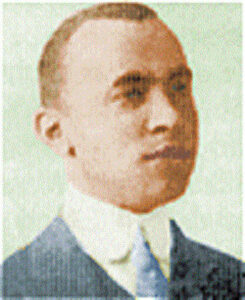
Ford Dabney
*Ford Dabney was born on March 15, 1883. He was a Black ragtime pianist, composer, songwriter, and band director.
Ford Thompson Dabney was from Washington, D.C., and was the son of John Wendell Dabney. He attended the business education division of M Street High School and Dunbar High School) grades nine through eleven. Dabney then attended Armstrong Manual Training School in Washington. He sang in the church choir of St. Mary's Protestant Episcopal Chapel, a mission on the current campus of George Washington University. Dabney studied music privately first with his father, uncle, and Samuel Fabian, a concert pianist.
From around October 1910 through 1911, Dabney owned and operated a "Ford Dabney's Theater." The theater's tagline in newspaper ads read, "Refined vaudeville and motion pictures." In 1910, Dabney and violinist Willie Carroll conceived and produced Dabney's Ginger Girls, who first performed at his theater before going on the road. The Ginger Girls were a duet: Lottie Gee, dancer and soprano, and Effie King, dancer and contralto. He is best known as the composer and lyricist of the 1910 song "That's Why They Call Me Shine," which has endured as a jazz standard. As of 2020, "Shine" has been recorded 646 times in the jazz genre.
Dabney and one of his chief collaborators, James Reese Europe, were transitional figures in the prehistory of jazz that evolved from ragtime. Their 1914 composition, "Castle Walk," – recorded on February 10, 1914, by Europe's Society Orchestra with Dabney at the piano, is one of the earliest jazz recordings. After losing his job in 1921 at the New Amsterdam Theatre, Dabney continued working in New York, composing for three more decades. Notably, he scored all the music and co-wrote the lyrics for Rang Tang in 1927. His film credits include the 1934 film Social Register and the 1943 film Stormy Weather (as a consultant).
Dabney operated an entertainment bureau for many years. He was close friends with Thurgood Marshall's family and was an honorary pallbearer for the funeral of Marshall's first wife, Vivian Burey Marshall. Dabney died June 6, 1958, in Manhattan, at the Sydenham Hospital—two months and nine days after the death of W.C. Handy.